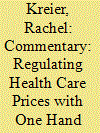|
|
|
Sort Order |
|
|
|
Items / Page
|
|
|
|
|
|
|
| Srl | Item |
| 1 |
ID:
174743


|
|
|
|
|
| Summary/Abstract |
Last year in this journal, I offered an explanation for America’s high health care costs rooted in the concept of “supply-side moral hazard,” and advocated for an all-payer system of price regulation as an appropriate policy response. The good news—particularly in the current time of pandemic—is that politicians and health services researchers are beginning to acknowledge the need for some form of price regulation. Legislative proposals thus far have focused narrowly on pharmaceutical prices and “surprise billing” for out-of-network charges. However, a few months ago, in March 2020, three Harvard researchers released a more comprehensive proposal. The bad news is that the proposal would preserve a large role for market forces, which, I argue here, amounts to going into battle against high health care costs with one hand tied behind your back. Furthermore, the reliance on private markets would lock in place the rampant inequality and Byzantine complexity bedeviling American health care.
|
|
|
|
|
|
|
|
|
|
|
|
|
|
|
|
| 2 |
ID:
174741


|
|
|
|
|
| Summary/Abstract |
This article considers the potential for the COVID-19 pandemic to represent an epochal moment in international politics, one which China can use as a window to maximize its international order-building efforts. It is argued that China’s putative international order-building efforts to date have faltered, in part, due to an inability to create meaningful friendships with prominent international powers. However, the COVID-19 pandemic allows China to play a key humanitarian role in heavily afflicted countries and, through this, perhaps an opportunity to forge more meaningful friendships. It is argued that China is trying to attach its concept of friendship to its humanitarian assistance while also stepping into the clear international leadership void that exists at the moment. This is not without faults or missteps, but the lasting impact could be significant for international politics and the global order.
|
|
|
|
|
|
|
|
|
|
|
|
|
|
|
|
| 3 |
ID:
174742


|
|
|
|
|
| Summary/Abstract |
Among various geopolitical repercussions of the COVID-19 pandemic are redefinitions of the short-term priorities of many international organizations. Among others, the European Union (EU) and North Atlantic Treaty Organization (NATO) are becoming absorbed by new internal challenges, and are thus even less interested in further enlargement than before. Against this background, Kyiv, Tbilisi, and Chisinau, as well as their Western friends, need to seek new paths to increase the three countries’ security, resilience, and growth before their accession to the West’s major organizations. Above all, an alternative way to decrease Ukraine’s current institutional isolation is to develop more intense bilateral relations with friendly states across the globe, including Germany and the United States. In Eastern Europe, moreover, Ukraine, Georgia, and Moldova should attempt to create new multilateral networks with post-communist member countries of NATO as well as the EU, and try to become part of such structures as the Three Seas Initiative or Bucharest Nine group.
|
|
|
|
|
|
|
|
|
|
|
|
|
|
|
|
| 4 |
ID:
174739


|
|
|
| 5 |
ID:
174740


|
|
|
|
|
| Summary/Abstract |
The severe acute respiratory syndrome coronavirus 2 (SARS-CoV-2) is neutral. It does not discriminate: the outbreak affects all countries. Yet, countries with better governance detect and report COVID-19 cases an average of 34 days earlier than countries with low governance scores. They also report a significantly higher number of cases, and more deaths but lower death-per-case ratios. Analyzing the statistical relationship between the good governance indicators devised by the World Bank with data pertaining to COVID-19 (to May 10, 2020), we present some initial yet strong statistical evidence that countries with higher levels of good governance based on the Worldwide Governance Indicators report more (cases, deaths), report earlier, and are more effective at reducing fatalities. These findings remain robust after controlling for population size, population density, old-age population, and the number of tourist arrivals. Countries with better governance are more successful in treating the disease and in reducing its deadliness. Good governance matters.
|
|
|
|
|
|
|
|
|
|
|
|
|
|
|
|
|
|
|
|
|